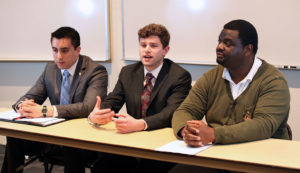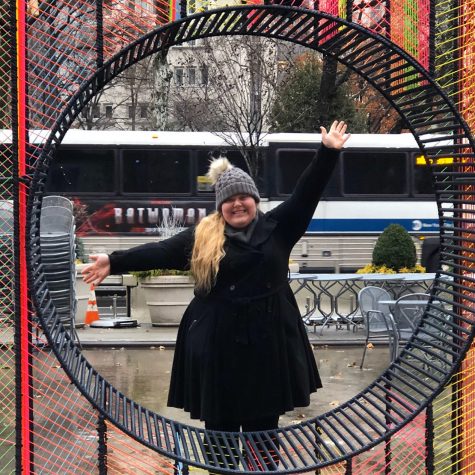
The first of two Student Government Association election debates introduced the candidates to the student body on Feb. 21. Once the floor was opened to questions, the candidates responded to issues that directly interest students.
The first debate focused on the stances and positions they will take in the upcoming school year. Around 40 people attended the debate and heard from each candidate.
Presidential candidate Maria Peña, political science junior, said the first debate allows people to “feel out” each candidate and see if they can provide the best fit for the students.
“We are actually reaching a lot of students, but Bolin doesn’t really get filled the first time, but that doesn’t discourage me,” Peña said. “We have the Twitter Periscope option and Facebook live where people can watch it and re-watch it, but I think the cool thing about the people that came is that they wanted to be there.”
Although the students are able to stream the debate, Peña said the ones that physically came to the debate had a “better opportunity to interact” with candidates.
“If they were watching at home, they wouldn’t have been able to see me and they can’t tell if we are being sincere or not,” Peña said. “The thing about being here is that we can be face-to-face, and people can read people and tell if they are being genuine or not.”
Peña’s opponent, psychology sophomore Kendall Nelms also has her eyes set on the presidential position. With “new and fresh ideas,” Nelms said she will give the voice back to the students through organizing the committees SGA helps make them more visible to the incoming students and encourage involvement early on.
With about 40 people watching, Manny Hoffmann, political science junior, Jacob Warren, economics junior, and Damian DeSilva, economic senior, campaign for vice president.
Second and final debate — Feb. 27 at 7 p.m., Bolin 127.
While the president will certainly have responsibilities, Warren said the vice president will not only be the “right hand man” for either Nelms or Peña, but will be an extension of the organization to students and committees alike.
“We need to be out with the organization and ask if we can help in any way,” Warren said. “We want to engage the student body and figure out what they like, what they don’t like, and how can we better serve them.”
Alongside visibility, however, DeSilva said SGA is “supposed to be the intermediate between faculty and students” as well as the “catalyst for change” on campus. With that, DeSilva said student government should be servant-oriented, which is something he will focus on.
The debate primarily focused on each individual’s plans for the up coming school year, but at its core, Hoffmann said SGA is for the students and the students urge action from the organization.
“We are leading the charge not only as a voice of the students, but really the forum on change on our campus,” Hoffmann said. “We want to make Midwestern our university and make sure it reflects our interests.”
The secretary candidates are Yenifer Valenzuela, finance junior, Ricinda Turner, mass communication junior, Jaylon Williams sociology senior, and Patrick German, political science junior. German was absent from the first debate.
Turner said she wants to bring the “small communities” together since different backgrounds push diversity and move inclusion further. Williams said she will focus on increasing student involvement in organizations on campus to then increase interaction in the Wichita Falls community. While Turner and Williams discussed outside interaction, Valenzuela said she wants to push for a mentor program for transfer and freshmen students to strengthen the student body first.
Following the debate, Kyle Keel, moderator and government professor, opened the floor to the audience for questions.
Tyler Garcia, political science senior, asked Peña and Nelms what service leadership meant to each candidate and how they plan to impact students on campus and said he was pleased with the responses from both candidates.
“It went very smoothly, and I’m proud of where we are as a university,” Garcia said. “I’m optimistic about where the student government is. It was a good turnout for this debate and I was glad to see the students on campus get involved with government and curious about who their representatives are going to be.”
Garcia said SGA will need to take the positives that have been accomplished over the last three years and build off that momentum if they expect to continue the progress into the 2017-2018 school year.
“If every year we change what was going on the year before, we’re not going to get anywhere,” he said.

















